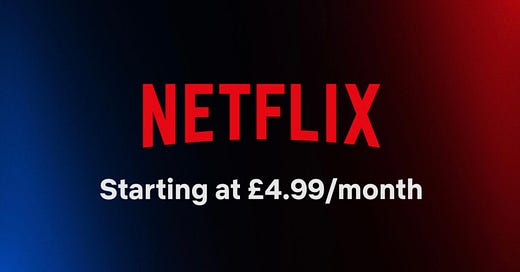Never say never? Or, it’s not the strategy until it’s the strategy
Assessing Netflix’s strategic U-turns
“No advertising coming onto Netflix. Period.” So wrote Reed Hastings on Facebook in 2015.
Fast forward to 2022 and Netflix Basic with ads is live and, if the promotions on my social feeds are anything to go by, is being aggressively marketed.
It’s not the company’s first strategic U-turn.
In Netflix’s Q1 2017 Letter to Shareholders, it responded to questions from investors about Amazon’s move into sport streaming thus: “That is not a strategy that we think is smart for us since we believe we can earn more viewing and satisfaction from spending that money on movies and TV shows“.
Later that same year, Maria Ferreras, then VP Business Development at Netflix, told an audience at OTTtv World Summit that Netflix wouldn’t be doing “live, or sport”.
Last week the company announced its first live stream and reports emerged that it has been busy bidding for the streaming rights for a number of different sporting events.
Back in 2014, Netflix said offline viewing was “never going to happen” and described it as a “short term fix for a bigger problem”. Two years later, they added the feature.
All three of these U-turns make sense to me - both the company’s original position and the timing of the change.
In 2015, doubling-down on an ad-free subscription model was the right call and enabled Netflix to lead the growth of a new sector and steal a march on established TV companies.
Whilst Reed Hastings might wish he’d made the call to embrace ads a year earlier, Netflix have still managed to get their ad proposition out the door before Disney and in time for the full force of the recession to start hitting, when a lower price point could prove key to maintaining subscriber numbers.
Similarly, in 2017, focusing its content spend on developing original series like Stranger Things and The Crown rather than (even more) eye-wateringly expensive (Amazon is reportedly paying $1bn a year for 15 Thursday Night NFL games) and eminently losable sports rights made a lot of sense.
Looking to add some second-tier sport to the mix in 2022 also makes sense in the context of Amazon and Apple’s continued push in this area, the Warner Bros. Discovery merger (and joint venture with BT Sport) and the likelihood of Disney merging ESPN+ with Disney+.
Netflix’s 2014 position on offline viewing was born out of an appreciation of the complexity involved in clearing the rights and developing the functionality versus the amount of volume of offline viewing that would actually take place (plus a sprinkling of unfounded optimism about the imminence of ubiquitous connectivity).
However, when it became clear that a small but material proportion of current and would-be Netflix subscribers viewed offline viewing as essential, they quickly changed their tune (and caught up with the likes of BBC iPlayer ;)
So, should Netflix have been so definitive in their original positions on these topics?
I think taking such a firm line makes a lot of sense for publicly traded companies, where clarity and confidence in the current strategy is key (see Elon Musk’s Twitter car crash for a counterpoint).
You can change your position at any point, citing changes in the market or consumer behaviour (see Steve Jobs’ pre-iPad Mini pronouncements on why 10 inches is the minimum viable screen size for a tablet).
An apparent surety in strategic approach is often construed as ideological. More often, it’s pragmatic and contextual. In a 2020 interview with Variety, Reed Hastings was clear that not introducing advertising was “definitely not a rule. It’s a judgment call…it's basically what we think is the best capitalism, as opposed to a philosophical thing." Sometime between Sep 2020 and Apr 2022, that judgement call changed.
So, feel free to make definitive statements about what you will and won’t do as a company and then update your position when the equation changes. Just maybe not as often as Musk, who I’d suggest is not so much U-turning as doughnutting…




